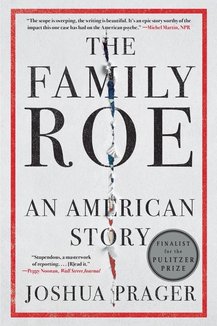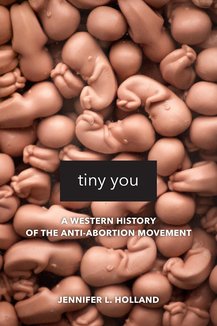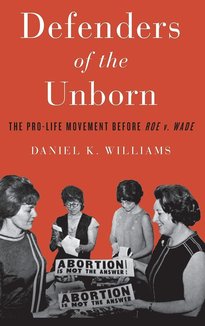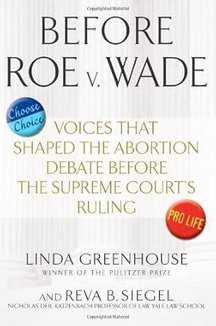Recommended Books

The Family Roe: An American Story
Author:
Joshua Prager
ISBN 13:
978-1324036074
Finalist for the 2022 Pulitzer Prize for General Nonfiction Finalist for the J. Anthony Lukas Book Prize Finalist for the National Book Critics Circle Award for Nonfiction One of NPR 's Best Books of 2021 A New York Times Notable Book of 2021 One of TIME 's 100 Must-Read Books of 2021 "The scope is sweeping, the writing is beautiful. It’s an epic story worthy of the impact this one case has had on the American psyche." ―Michel Martin, NPR "Stupendous…. If you want to understand Roe more deeply before the coming decision, read it." ―Peggy Noonan, Wall Street Journal A masterpiece of reporting on the Supreme Court’s most divisive case, Roe v. Wade, and the unknown lives at its heart. Despite her famous pseudonym, “Jane Roe,” no one knows the truth about Norma McCorvey (1947–2017), whose unwanted pregnancy in 1969 opened a great fracture in American life. Journalist Joshua Prager spent hundreds of hours with Norma, discovered her personal papers―a previously unseen trove―and witnessed her final moments. The Family Roe presents her life in full. Propelled by the crosscurrents of sex and religion, gender and class, it is a life that tells the story of abortion in America. Prager begins that story on the banks of Louisiana’s Atchafalaya River where Norma was born, and where unplanned pregnancies upended generations of her forebears. A pregnancy then upended Norma’s life too, and the Dallas waitress became Jane Roe. Drawing on a decade of research, Prager reveals the woman behind the pseudonym, writing in novelistic detail of her unknown life from her time as a sex worker in Dallas, to her private thoughts on family and abortion, to her dealings with feminist and Christian leaders, to the three daughters she placed for adoption. Prager found those women, including the youngest―Baby Roe―now fifty years old. She shares her story in The Family Roe for the first time, from her tortured interactions with her birth mother, to her emotional first meeting with her sisters, to the burden that was uniquely hers from conception. The Family Roe abounds in such revelations―not only about Norma and her children but about the broader “family” connected to the case. Prager tells the stories of activists and bystanders alike whose lives intertwined with Roe. In particular, he introduces three figures as important as they are unknown: feminist lawyer Linda Coffee, who filed the original Texas lawsuit yet now lives in obscurity; Curtis Boyd, a former fundamentalist Christian, today a leading provider of third-trimester abortions; and Mildred Jefferson, the first black female Harvard Medical School graduate, who became a pro-life leader with great secrets. An epic work spanning fifty years of American history, The Family Roe will change the way you think about our enduring American divide: the right to choose or the right to life. 16 pages of illustrations

Tiny You: A Western History of the Anti-Abortion Movement
Author:
Jennifer L. Holland
ISBN 13:
978-0520295872
Caroline Bancroft History Prize 2021, Denver Public Library Armitage-Jameson Prize 2021, Coalition of Western Women's History David J. Weber Prize 2021, Western History Association W. Turrentine Jackson Prize 2021, Western History Association Tiny You tells the story of one of the most successful political movements of the twentieth century: the grassroots campaign against legalized abortion. While Americans have rapidly changed their minds about sex education, pornography, arts funding, gay teachers, and ultimately gay marriage, opposition to legalized abortion has only grown. As other socially conservative movements have lost young activists, the pro-life movement has successfully recruited more young people to its cause. Jennifer L. Holland explores why abortion dominates conservative politics like no other cultural issue. Looking at anti-abortion movements in four western states since the 1960s—turning to the fetal pins passed around church services, the graphic images exchanged between friends, and the fetus dolls given to children in school—she argues that activists made fetal life feel personal to many Americans. Pro-life activists persuaded people to see themselves in the pins, images, and dolls they held in their hands and made the fight against abortion the primary bread-and-butter issue for social conservatives. Holland ultimately demonstrates that the success of the pro-life movement lies in the borrowed logic and emotional power of leftist activism.

Defenders of the Unborn: The Pro-Life Movement before Roe v. Wade
Author:
Daniel K. Williams
ISBN 13:
978-0199391646
On April 16, 1972, ten thousand people gathered in Central Park to protest New York's liberal abortion law. Emotions ran high, reflecting the nation's extreme polarization over abortion. Yet the divisions did not fall neatly along partisan or religious lines-the assembled protesters were far from a bunch of fire-breathing culture warriors. In Defenders of the Unborn , Daniel K. Williams reveals the hidden history of the pro-life movement in America, showing that a cause that many see as reactionary and anti-feminist began as a liberal crusade for human rights. For decades, the media portrayed the pro-life movement as a Catholic cause, but by the time of the Central Park rally, that stereotype was already hopelessly outdated. The kinds of people in attendance at pro-life rallies ranged from white Protestant physicians, to young mothers, to African American Democratic legislators-even the occasional member of Planned Parenthood. One of New York City's most vocal pro-life advocates was a liberal Lutheran minister who was best known for his civil rights activism and his protests against the Vietnam War. The language with which pro-lifers championed their cause was not that of conservative Catholic theology, infused with attacks on contraception and women's sexual freedom. Rather, they saw themselves as civil rights crusaders, defending the inalienable right to life of a defenseless minority: the unborn fetus. It was because of this grounding in human rights, Williams argues, that the right-to-life movement gained such momentum in the early 1960s. Indeed, pro-lifers were winning the battle before Roe v. Wade changed the course of history. Through a deep investigation of previously untapped archives, Williams presents the untold story of New Deal-era liberals who forged alliances with a diverse array of activists, Republican and Democrat alike, to fight for what they saw as a human rights cause. Provocative and insightful, Defenders of the Unborn is a must-read for anyone who craves a deeper understanding of a highly-charged issue.

Before Roe v. Wade: Voices that Shaped the Abortion Debate Before the Supreme Court's Ruling
Authors:
Linda Greenhouse
,
Professor Reva B Siegel
,
Reva Siegel
ISBN 13:
978-1607146711
The Supreme Court’s 1973 decision in Roe v. Wade legalized abortion–but the debate was far from over, continuing to be a political battleground to this day. In the decades since the case was decided, the American debate on abortion has moved away from the issues that the justices confronted more than three decades ago. Bringing to light key voices that illuminate the case and its cultural context, Before Roe v. Wade looks back and recaptures how the arguments for and against abortion took shape as claims about the meaning of the Constitution—and about how the nation could best honor its commitment to dignity, liberty, equality, and life. In this ground-breaking book, Linda Greenhouse, a Pulitzer Prize-winning journalist who covered the Supreme Court for 30 years for The New York Times , and Reva Siegel, a renowned professor and former deputy dean at Yale Law School, collect the most significant historical, cultural, and legal documents which helped shape the Supreme Court’s controversial decision.